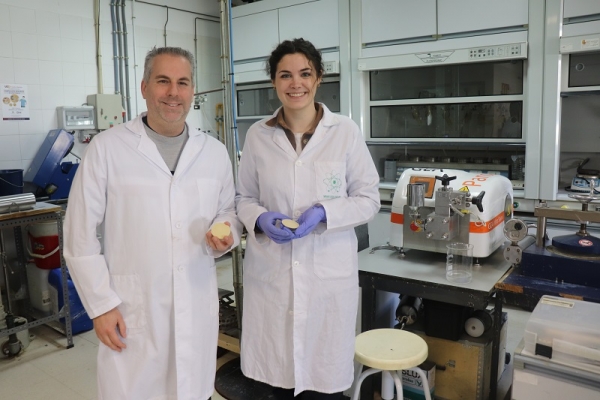Pads incorporated into fresh meat packaging, whose function is to absorb the moisture generated in it, and that can cause food spoilage, are generally composed of plastic polymers derived from petroleum by-products. In today’s world, in which European and national regulations and international agreements call for a future in which plastics are avoided, to avert their negative effects on human health and the environment, the Biopren research group in the Chemical Engineering Area of the University of Cordoba has developed natural-waste padding that not only absorbs moisture, like conventional pads do, but also delays the oxidation of the meat. This innovation, which is still in the concept development phase, uses organic waste, thus favoring the efficient use of resources and bolstering the Circular Economy.
To this end, the pads developed, whose shape is similar to that of make-up removers, and are called aerogels, are composed of three basic elements. First, the base is made of chitosan, a polymer derived from crustacean shells. Compared to the plastic polymers used in commercial pads, the study uses a natural one. Chitosan, however, does have some disadvantages, including its irregular structure, and the fact that it is more soluble in water, and is weaker. To counteract this, the research team added the other two elements: nanocellulose from laurel pruning -one of the most widely grown aromatic and medicinal plant crops in the Mediterranean area- and bay leaf essential oil, which make the pad stiffer and more durable, and delay oxidation of the meat.
With these three elements, explains Esther Rincón of the research group, "what we have managed to do is to keep the meat in a fresh state, like at the beginning, after ten days of refrigerated storage."
The study, which has been published on the cover of the journal Polymers, is a first step, a proof of concept. Future studies will need to focus on the safety and healthiness of the pads to verify, for example, that no components seep into the meat that might produce allergic reactions.
Reference
Esther Rincón, Eduardo Espinosa, María Pinillos and Luis Serrano (2023) "Bioactive Absorbent Chitosan Aerogels Reinforced with Bay Tree Pruning Waste Nanocellulose with Antioxidant Properties for Burger Meat Preservation" Polymers 15, nº. 4: 866. https://doi.org/10.3390/polym15040866


